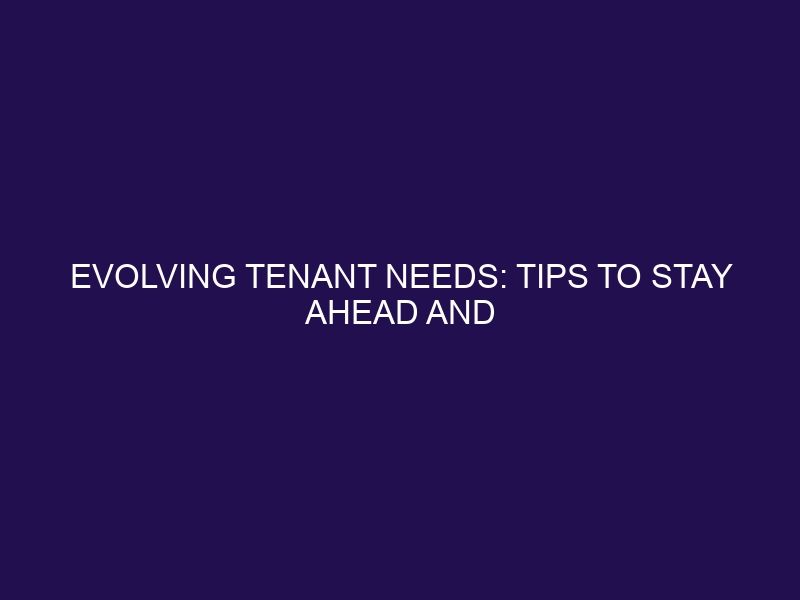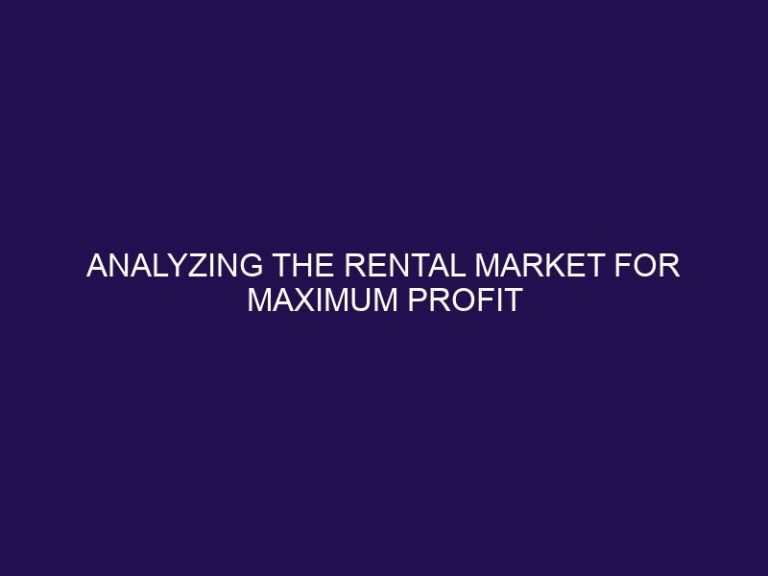Evolving Tenant Needs: Tips to Stay Ahead and Retain your Tenants
In today’s dynamic real estate landscape, property managers face the ongoing challenge of staying ahead of evolving tenant needs. With shifting preferences and demands, it’s crucial for property managers to assess their portfolios, communicate effectively with tenants, and stay informed about market trends.
From upgrading properties to embracing smart home technology and prioritizing health and wellness, the strategies for meeting evolving tenant needs are diverse and constantly evolving. In this article, we will delve into the key strategies for property managers to navigate the changing landscape, innovate leasing models, and invest in sustainable and energy-efficient features to create a tenant-centric approach.
With a focus on engaging with tenants, benchmarking competitors, and offering flexible lease options, we will explore how property managers can proactively meet the changing needs of tenants and stay at the forefront of the industry. So, let’s explore the most popular industry trends and valuable resources for property managers to effectively address the evolving needs of their tenants.
Key Takeaways:
Staying Ahead of Evolving Tenant Needs: Strategies for Property Managers
As property managers navigate the dynamic landscape of commercial leasing and real estate, it is vital to continually assess and adapt to the evolving tenant needs and preferences to ensure tenant satisfaction and maximize property performance.
Property managers face the challenge of staying abreast of the ever-changing market trends to meet the diverse needs of tenants. With the increasing demand for flexible spaces and sustainable features, they must seek opportunities to incorporate these preferences into property offerings.
Utilizing tenant feedback becomes crucial in understanding their expectations and addressing any concerns promptly. Creating effective leasing strategies is essential to attract and retain tenants, enhancing property occupancy rates and maximizing revenue potential.
Assessing the Portfolio
One of the first steps in staying ahead of evolving tenant needs is to thoroughly assess the current portfolio of properties managed, understanding the unique requirements and preferences of tenants across different sectors such as retail, office, medical office, and industrial space.
Communicating with Tenants
Effective communication with tenants is essential to gain valuable insights into their needs and preferences, forming the basis for proactive property management strategies and tenant satisfaction.
Monitoring Market Trends
Property managers must stay abreast of current and projected market trends, leveraging comprehensive market research and data analysis to inform effective strategies that align with the evolving needs and preferences of the tenant mix in the California real estate market.
Upgrading Properties
Investing in sustainable energy-efficient features, smart home technology, and tenant improvement initiatives is crucial for upgrading properties to meet the evolving needs and preferences of tenants, ensuring high levels of tenant satisfaction and property performance in California and beyond.
Diversifying the Portfolio
Property managers can enhance their responsiveness to evolving tenant needs by diversifying the portfolio to include retail spaces that cater to the changing trends and preferences of tenants, thereby maximizing tenant satisfaction and property performance in California and beyond.
Innovating Leasing Models
Innovative leasing models that are tailored to the specific needs and preferences of tenants, backed by comprehensive market data analysis, can provide property managers with a competitive advantage in meeting tenant needs and maximizing tenant satisfaction in California and beyond.
Conducting Regular Surveys
Regular surveys and feedback mechanisms play a pivotal role in understanding and addressing the evolving needs and preferences of tenants, enabling property managers to enhance tenant satisfaction and refine property management strategies in California and beyond.
Creating Tenant Personas
Developing comprehensive tenant personas is essential for property managers to gain in-depth insights into the specific needs, preferences, and behaviors of different tenant segments, enabling tailored strategies that drive tenant satisfaction and property performance in California and beyond.
Engaging with Tenants
Active engagement with tenants through various channels and touchpoints is vital for property managers to foster meaningful relationships, gather valuable feedback, and align property management strategies with the evolving needs and preferences of tenants in California and beyond.
Benchmarking Competitors
Benchmarking against competitors in the real estate market allows property managers to identify opportunities for competitive advantage, address evolving tenant needs, and optimize the tenant mix for enhanced property management in California and beyond.
Conducting Market Research Regularly
Regular market research is imperative for property managers to develop effective strategies, stay up-to-date with evolving tenant needs and preferences, and optimize the tenant mix for successful property management in the dynamic real estate market of California and beyond.
Investing in Sustainable and Energy-Efficient Features
Property managers can enhance tenant satisfaction and address evolving needs by investing in sustainable and energy-efficient features that align with environmental consciousness and promote cost savings in California and beyond.
Embracing Smart Home Technology
The integration of smart home technology in properties enables property managers to address evolving tenant needs and preferences, offering enhanced convenience, security, and energy efficiency, leading to elevated levels of tenant satisfaction in California and beyond.
Offering Flexible Lease Options
Property managers can cater to the evolving needs and preferences of tenants by offering flexible lease options that are informed by comprehensive market data analysis, thereby optimizing tenant satisfaction and property performance in California and beyond.
Prioritizing Health and Wellness
Prioritizing the health and wellness of tenants through property management initiatives is essential for addressing evolving needs and preferences, contributing to enhanced tenant satisfaction and the overall wellbeing of tenants in California and beyond.
Meeting the Changing Needs of Tenants
Adapting to the changing needs of tenants is a continuous process for property managers, involving proactive responses to tenant feedback, the utilization of tenant personas, and leveraging property management services such as Assurant and Multifamily Housing for enhanced tenant satisfaction in California and beyond.
Watching Informative Discussions on Tenant Needs
Keeping a close watch on informative discussions related to tenant needs, preferences, and market data is essential for property managers to gain valuable insights that inform proactive property management strategies, thereby maximizing tenant satisfaction in California and beyond.
Most Popular Industry Trends
Understanding and adapting to the most popular industry trends, especially in the retail sector, is crucial for property managers to align with evolving tenant needs, optimize the current portfolio, and deliver superior tenant satisfaction in California and beyond.
Resources for Property Managers
Accessing relevant resources such as real estate seminars, sustainability profiles, and multifamily products can enable property managers to stay informed, adapt to changing market trends, and meet the diverse needs and preferences of tenants across their portfolios.
Frequently Asked Questions
What are evolving tenant needs?
Evolving tenant needs refer to the changing requirements and preferences of tenants in the real estate market. These needs can include factors such as location, amenities, and affordability.
How can landlords stay ahead of evolving tenant needs?
Landlords can stay ahead of evolving tenant needs by conducting market research, regularly evaluating their properties, and staying updated on trends in the real estate industry.
Why is it important to stay ahead of evolving tenant needs?
Staying ahead of evolving tenant needs is crucial for landlords to attract and retain tenants, maintain high occupancy rates, and maximize profits in the competitive real estate market.
What are some common factors that drive evolving tenant needs?
Some common factors that drive evolving tenant needs include changes in demographics, advancements in technology, and shifts in economic conditions.
How can landlords adapt their properties to meet evolving tenant needs?
Landlords can adapt their properties to meet evolving tenant needs by incorporating modern amenities, offering flexible lease terms, and providing a personalized experience for tenants.
What are the potential consequences of not staying ahead of evolving tenant needs?
Not staying ahead of evolving tenant needs can lead to high vacancy rates, difficulty in finding and retaining tenants, and decreased profitability for landlords. It may also result in losing out on potential opportunities for growth and success in the real estate market.







